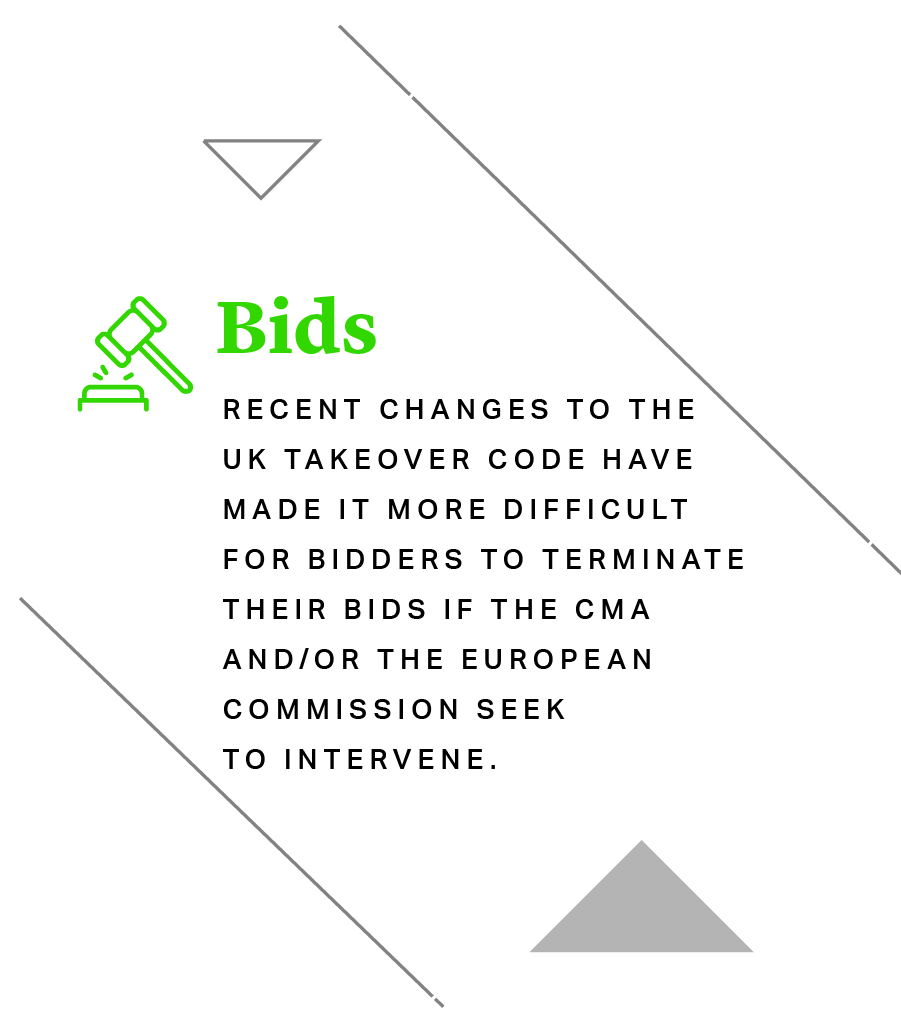
Worldwide, the approach of competition regulators to M&A is becomingly increasingly interventionist and unpredictable.
The recent approach of the UK competition agency, the Competition and Markets Authority (CMA), is a good example of this phenomenon.
In short, the CMA believes that M&A enforcement has been too permissive in Europe over the past 30 years.
The CMA has made clear its ambition to be a regulator of international import in international deals — as Dr Coscelli has explained, the CMA’s “ambition is very much to be at the top table discussing international mergers”.
The CMA’s general concerns over concentration levels have translated into consistently high intervention rates in M&A in recent years.
In 2020, the CMA frustrated ten transactions, and the intervention rate has remained high over 2021‒22.

The approach of the FTC and DOJ in the U.S., and the European Commission, in relation to M&A has also become increasingly interventionist and unpredictable.
Notably, the European Commission has indicated it is concerned about “killer acquisitions” (i.e., acquisitions of nascent competitors by dominant incumbents), especially in the digital and pharmaceutical sectors. As a result, the European Commission has sought to expand its jurisdiction to capture a broader range of transactions which it regards as potentially anti-competitive. Under new guidance introduced in 2021, the European Commission can investigate M&A deals that don’t trigger thresholds at the EU or national level. This approach has been endorsed by the European Court, which recently upheld the European Commission’s decision to investigate Illumina’s acquisition of Grail even though it did not meet filing thresholds.
Recent Changes to the UK Takeover Code Will Make it More Difficult for Bidders to Withdraw From UK Bids on Account of Competition Issues
One of the key principles underlying the Takeover Code is that a firm bid, once formally announced, should proceed except in exceptional circumstances.
This means that a bidder seeking to terminate its bid by relying on a condition (for instance, a condition that no regulator has materially altered the terms of the bid or imposed any material limitation) must satisfy the Takeover Panel that the relevant circumstances are of “material significance” to the bidder. In practice, this “material significance” test is a very high threshold and will require bidders to demonstrate that an adverse change of very considerable significance, striking at the heart of the purpose of the bid, has occurred.
Historically, a CMA or an EU competition condition in UK bids was not subject to this “material significance” test. This meant that bidders could seek to terminate their bids based on a CMA or EU competition condition where the circumstances were not necessarily “significant” to the bidder.
In addition, the Takeover Code historically provided that a bid would automatically lapse if the bid were referred to phase 2 by the CMA or the European Commission before certain defined dates.
These historical anomalies have now been removed in recent revisions to the Takeover Code. A bid will therefore no longer automatically lapse if referred to phase 2 by the CMA or European Commission, and any bidder seeking to rely on a CMA or EU competition condition must demonstrate the Takeover Panel that the “material significance” test has been met.


Recent Changes to the UK Takeover Code Will Make it More Difficult for Bidders to Withdraw From UK Bids on Account of Competition Issues
One of the key principles underlying the Takeover Code is that a firm bid, once formally announced, should proceed except in exceptional circumstances.

This means that a bidder seeking to terminate its bid by relying on a condition (for instance, a condition that no regulator has materially altered the terms of the bid or imposed any material limitation) must satisfy the Takeover Panel that the relevant circumstances are of “material significance” to the bidder. In practice, this “material significance” test is a very high threshold and will require bidders to demonstrate that an adverse change of very considerable significance, striking at the heart of the purpose of the bid, has occurred.
Historically, a CMA or an EU competition condition in UK bids was not subject to this “material significance” test. This meant that bidders could seek to terminate their bids based on a CMA or EU competition condition where the circumstances were not necessarily “significant” to the bidder.
In addition, the Takeover Code historically provided that a bid would automatically lapse if the bid were referred to phase 2 by the CMA or the European Commission before certain defined dates.
These historical anomalies have now been removed in recent revisions to the Takeover Code. A bid will therefore no longer automatically lapse if referred to phase 2 by the CMA or European Commission, and any bidder seeking to rely on a CMA or EU competition condition must demonstrate the Takeover Panel that the “material significance” test has been met.
What To Do?
So, in summary, worldwide competition regulators, including in particular the UK competition regulator, the CMA, are becoming tougher on M&A deals and are becoming more unpredictable.
Bidders should assume that bids will be increasingly scrutinized by competition regulators and that there will be more deals subject to merger review, more phase two or second requests by competition regulators, more deals blocked by competition regulators, more disposal remedies required by competition regulators and generally more unpredictability of competition outcome.
At the same time, recent changes to the UK Takeover Code have made it more difficult for bidders to terminate their bids if the CMA and/or the European Commission seek to intervene.
Competition issues in UK bids will therefore require even more focus as part of the bid planning process. Given that it will be difficult for bidders to terminate their bids after a formal launch on account of competition issues, bidders will also need to be even more focused on effective solutions, in particular in relation to potential remedy packages, to develop a clear pathway through any potential competition hurdles.

What To Do?
So, in summary, worldwide competition regulators, including in particular the UK competition regulator, the CMA, are becoming tougher on M&A deals and are becoming more unpredictable.

Bidders should assume that bids will be increasingly scrutinized by competition regulators and that there will be more deals subject to merger review, more phase two or second requests by competition regulators, more deals blocked by competition regulators, more disposal remedies required by competition regulators and generally more unpredictability of competition outcome.
At the same time, recent changes to the UK Takeover Code have made it more difficult for bidders to terminate their bids if the CMA and/or the European Commission seek to intervene.
Competition issues in UK bids will therefore require even more focus as part of the bid planning process. Given that it will be difficult for bidders to terminate their bids after a formal launch on account of competition issues, bidders will also need to be even more focused on effective solutions, in particular in relation to potential remedy packages, to develop a clear pathway through any potential competition hurdles.
Sam Bagot
Partner
London
T: +44 20 7614 2232
sbagot@cgsh.com
V-Card

Tihir Sarkar
Partner
London
T: +44 20 7614 2205
tsarkar@cgsh.com
V-Card
Dan Tierney
Associate



